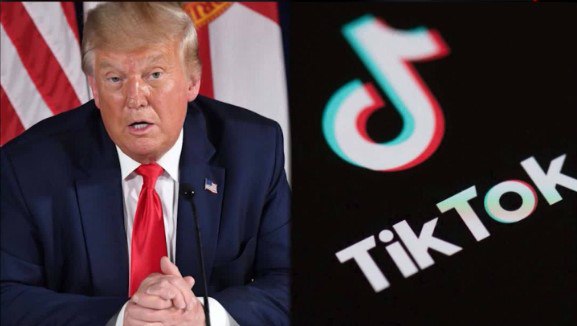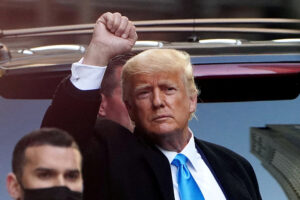Trump suggests that banning TikTok could benefit Facebook, regardless of its status as a potential national security risk.

In a recent interview on CNBC’s “Squawk Box,” former President Donald Trump reiterated his concerns about TikTok posing a potential national security threat. However, he expressed reluctance towards endorsing a bill in Congress aiming to ban TikTok and other ByteDance apps from major app stores and U.S. web hosting services. Trump emphasized the popularity of TikTok among its users, particularly the younger demographic.
During the call-in interview, Trump acknowledged the mixed aspects of TikTok, stating, “There’s a blend of positive and negative content on TikTok. Yet, what I find concerning is that by eliminating TikTok, you inadvertently empower Facebook, a platform I view as adversarial to the people, along with a significant portion of the media.”
“When I look at it, I’m not looking to make Facebook double the size,” he added. ”I think Facebook has been very bad for our country, especially when it comes to elections.”
Trump has consistently voiced grievances about Facebook’s role in the 2020 election, an election he still refuses to acknowledge losing to President Joe Biden. This includes expressing discontent over at least $400 million contributed by Mark Zuckerberg, Facebook’s founder, and his wife to two nonprofit organizations. These donations, entirely legal under campaign finance regulations, supported state and local governments in conducting the 2020 election amidst the challenges posed by the COVID-19 pandemic.
The role of TikTok, a popular video-sharing app, has become a focal point in the 2024 presidential campaign, boasting approximately 170 million users in the U.S., predominantly from a younger demographic that both political parties are eager to engage. Despite President Biden officially joining TikTok last month, citing the platform’s appeal to younger voters, he has concurrently expressed concerns about its national security implications. Biden endorsed legislation on Friday that could potentially lead to TikTok’s ban, a bill unanimously passed by the U.S. House Energy and Commerce Committee.
Former President Trump, during his tenure, sought to ban TikTok through an executive order, citing national security threats. Legal challenges ensued, arguing that such actions would infringe on free speech and due process rights. When questioned about his ongoing belief in TikTok as a national security risk, Trump maintained his stance, emphasizing the need to safeguard American privacy and data rights. However, he acknowledged similar concerns with Facebook and other companies, alleging that some American entities, by engaging with China, pose a national security risk.
President Biden, in 2022, prohibited nearly 4 million federal government employees from using TikTok on agency-owned devices, with limited exceptions for specific purposes. He also signed an executive order aimed at preventing the large-scale transfer of Americans’ personal data to countries of concern, including China. The FBI and the Federal Communications Commission have issued warnings about potential data sharing between TikTok’s owner, ByteDance, and China’s government, though no concrete evidence has been provided.
In a recent post on his Truth Social site, Trump expressed support for TikTok, asserting that banning it would only benefit Facebook and Mark Zuckerberg. During the interview, Trump disclosed a brief meeting with TikTok investor and GOP donor Jeff Yass but affirmed that TikTok was not discussed. Additionally, Trump confirmed a recent meeting with Elon Musk, acknowledging their opposing views on electric cars but remaining uncertain about Musk’s potential support for his political campaign.





